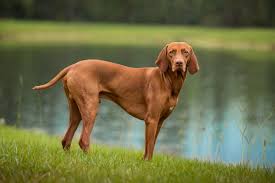
Vizsla
Conditions of detention
Vizslas are adaptable but thrive best in environments where they have plenty of space to roam and exercise. They are well-suited to active families and individuals who can provide regular physical activity and mental stimulation.
Useful Fact:
Vizslas are known for their energy and enthusiasm and require at least one to two hours of exercise daily to keep them happy and healthy.
Nutrition and diet
A balanced diet rich in high-quality proteins and essential nutrients is crucial for the Vizsla to support its active lifestyle. High-quality commercial dog food or a diet incorporating lean meats, vegetables, and grains is recommended.
Useful Fact:
Feeding them a diet that supports their energy levels and muscle mass helps maintain their health and vitality, especially given their active nature.
Health
Vizslas are generally healthy dogs but can be prone to certain genetic conditions such as hip dysplasia, epilepsy, and eye disorders. Regular veterinary check-ups are essential to monitor their health.
Useful Fact:
Maintaining a healthy weight and providing regular exercise can help prevent common health issues and keep them in top physical condition.
Grooming and care
The Vizsla has a short, smooth coat that requires minimal grooming. Regular brushing helps remove loose hair and keep their coat shiny and healthy.
Useful Fact:
Their low-maintenance coat is easy to care for, requiring only occasional baths and regular brushing to maintain cleanliness.
Education and training
Vizslas are intelligent and eager to please, making them relatively easy to train. They respond well to positive reinforcement and consistency.
Useful Fact:
Early socialization and obedience training are crucial to ensure they develop into well-mannered dogs that are comfortable around people and other animals.
Toys and entertainment
These dogs enjoy toys that challenge their minds and bodies, such as puzzle toys, fetch toys, and interactive games. Engaging in activities like agility training and scent work can be very stimulating for them.
Useful Fact:
Providing a variety of toys and regular playtime helps keep them mentally and physically active, preventing boredom and destructive behavior.
Safety
Due to their strong prey drive and high energy levels, Vizslas should be kept in a secure area when outdoors. They need to be monitored to prevent them from wandering off or chasing wildlife.
Useful Fact:
A well-fenced yard is essential to give them the freedom to roam safely without the risk of escaping.
Accessories
Sturdy collars, harnesses, and leashes are important for managing the Vizsla during training and outdoor activities.
Useful Fact:
Using a harness can provide better control and prevent neck strain, especially during walks and training sessions.
Socialization
Vizslas are friendly and form strong bonds with their families but can be reserved with strangers. Early and consistent socialization is important to ensure they are comfortable in various environments.
Useful Fact:
Introducing them to different people, animals, and settings from a young age helps them become well-adjusted and confident adults.
Travel and Transportation
Vizslas can travel well if they are accustomed to it from a young age. Ensuring they have a comfortable and secure space in the vehicle is important.
Useful Fact:
Using a travel crate or a harness designed for car travel ensures their safety and comfort during trips.
Behavior and psychology
The Vizsla is known for its loyalty, intelligence, and affectionate nature. They form strong bonds with their families and are naturally protective.
Useful Fact:
Understanding their need for companionship and providing proper training can help manage their behavior and ensure they are confident and well-behaved.
Legal aspects
Owners should comply with general dog ownership laws, such as licensing, vaccination requirements, and leash laws.
Useful Fact:
In some areas, there may be specific regulations regarding hunting breeds, so checking local laws is important.


